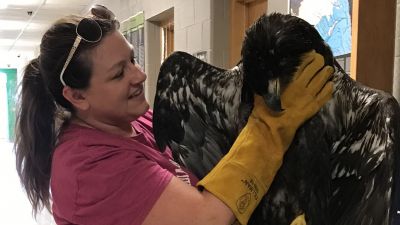Concordia Students Receive "Hands-On" Training in Raptor Recovery

When a bald eagle is injured or in distress, there’s a good chance assistant professor of biology Jennifer Fruend’s phone will ring. In early August, she received a call from the Norfolk, Nebraska area about an eagle that had been hit by a car.
“I could tell when I picked it up that it didn’t weigh much and was malnourished,” said Fruend. “I was able to get it back to my lab for triage, fluids and nutrition.”
Fruend’s biology lab is home to a menagerie of animals including reptiles, mice, tarantulas frogs and more. It is also where she takes wounded raptors to care for and where her students get an up-close look at what it takes to be a conservation biologist.
Raptor Recovery of Nebraska a statewide network of volunteers operated out of Fontenelle Forest in Omaha. Raptors are birds of prey such as eagles, falcons, hawks, owls and vultures. Raptor Recovery is focused on the conservation of these birds through education, research and the rehabilitation of injured and orphaned raptors.
“I have gotten as many as four calls in 24 hours or sometimes not for two weeks,” Fruend said. “The Nebraska State Patrol has my number as does 911. Sometimes I get calls from Raptor Recovery if there is an injured animal in my area. When I can, I take my students with me on recovery.”
When an injured bird is brought in, Concordia students will help wrap wings, feed and water, provide triage and whatever is needed.
“At Concordia, I have the opportunity to help students find their confidence and teach them how to be a Christian and a scientist and someone who lives joyfully taking care of our planet as our God told us to do,” Fruend said.